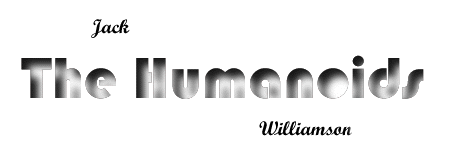

- "the best possible machines, designed with the best of intentions, become the ultimate horror"
- -Jack Williamson on The Humanoids

Jack Williamson's novel, The Humanoids (1949), is considered of the most important stories about robots and humanity. Many previous stories about robots, excluding Asimov's, portrayed robots as evil beings bent on the destruction of humanity. The robots in The Humanoids have exactly the opposite problem--they are too benevolent. Their Prime Directive is "To Serve and Obey, And Guard Men From Harm" but they take it too far. Asimov's robots are often in the position of saving humanity from itself, but these robots turn humans into docile sheep by following their programming too closely. They do not allow any risky behavior, they do not allow unhappiness, they do not allow anything new or exciting: they basically do not allow humans to be human. This story is similar to many utopian/dystopian novels such as 1984 and Zamiatin's We where humans are kept under control for their own protection, but it leads to a stifling of the human spirit, freedom,and creativity. A group of humans rebel against this tyranny but the robots soon learn how to make them happy as well.
This novel is an expansion of the original influential story "With Folded Hands" (1947) by Jack Williamson. The title refers to the only thing left for humanity to do: sit with folded hands as the robots take care of all their troubles.